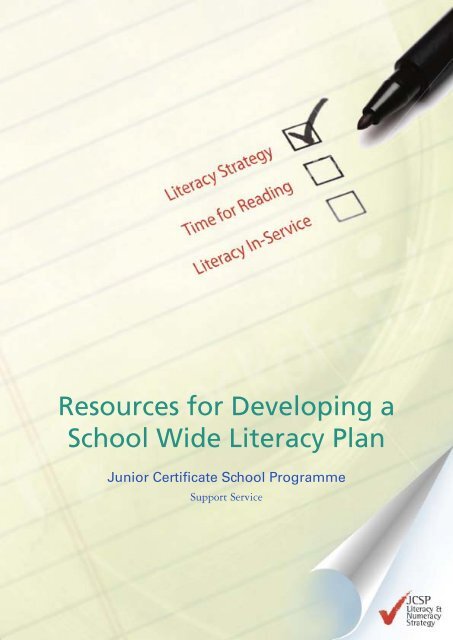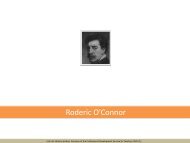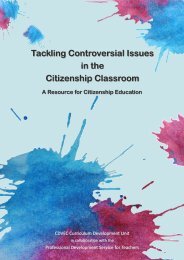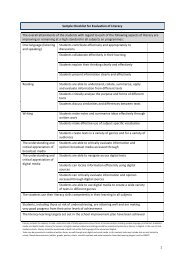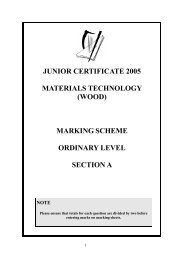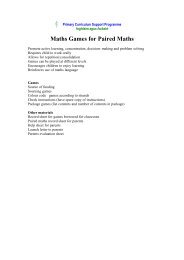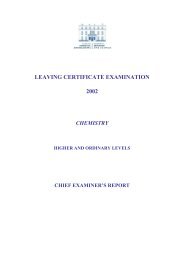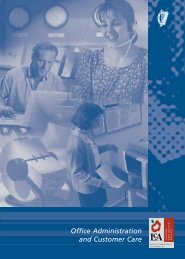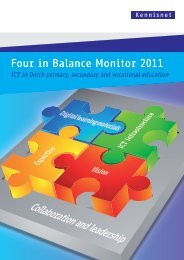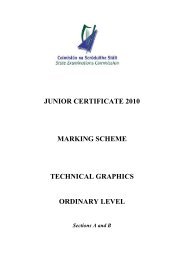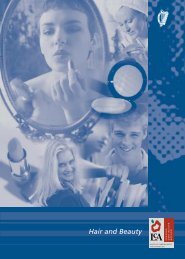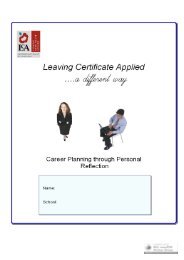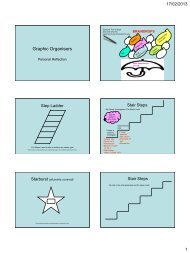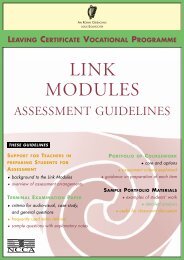Resources for Developing a School Wide Literacy Plan - PDST
Resources for Developing a School Wide Literacy Plan - PDST
Resources for Developing a School Wide Literacy Plan - PDST
Create successful ePaper yourself
Turn your PDF publications into a flip-book with our unique Google optimized e-Paper software.
<strong>Resources</strong> <strong>for</strong> <strong>Developing</strong> a<strong>School</strong> <strong>Wide</strong> <strong>Literacy</strong> <strong>Plan</strong>Junior Certificate <strong>School</strong> ProgrammeSupport Service
<strong>Resources</strong> <strong>for</strong> <strong>Developing</strong> a <strong>School</strong> <strong>Wide</strong> <strong>Literacy</strong> <strong>Plan</strong>Published in 2008 byJunior Certificate <strong>School</strong> Programme Support ServiceCurriculum Development UnitCaptain’s RoadCrumlinDublin 12Phone: 01 453 5487Fax: 01 453 7659Email: jcsp@iol.ieWeb: www.jcspliteracy.ieCopyright © Junior Certificate <strong>School</strong> Programme Support ServiceThe Junior Certificate <strong>School</strong> Programme Support Service is funded by the TeacherEducation Section, Department of Education and Science and the European Social Fund.The Junior Certificate <strong>School</strong> Programme <strong>Literacy</strong> and Numeracy Strategy and theDemonstration Library Project are funded by the Early <strong>Literacy</strong> Initiative and the DeliveringEquality of Opportunity in <strong>School</strong>s (DEIS) Action <strong>Plan</strong> within the Teacher EducationSection of the Department of Education and Science.The Junior Certificate <strong>School</strong> Programme is a national programme sponsored by theDepartment of Education and Science and the National Council <strong>for</strong> Curriculum andAssessment.The Support Service <strong>for</strong> the Junior Certificate <strong>School</strong> Programme is based in theCDVEC Curriculum Development UnitCaptain’s RoadCrumlinDublin 12Authors Aideen Cassidy & Bernie KielyThis publication has been produced as a result of collaboration between JCSP SupportService and the <strong>School</strong> Development <strong>Plan</strong>ning Support Service, Second Level.Design by www.paulmartin.ieEdited XXXXXXXX
<strong>Resources</strong> <strong>for</strong> <strong>Developing</strong> a <strong>School</strong> <strong>Wide</strong> <strong>Literacy</strong> <strong>Plan</strong>Contents1. Why a whole school approach to literacy? 32. Why a <strong>School</strong> <strong>Literacy</strong> <strong>Plan</strong>? 43. <strong>Literacy</strong> Committee/ Working Party 54. Preliminary Review of <strong>Literacy</strong> Provision 65. JCSP <strong>Literacy</strong> Related Initiatives & Materials 106. Staff Review of <strong>Literacy</strong> - Scaling Exercise 137. Integration of literacy development with other school activities 158. Writing the literacy element of the <strong>School</strong> <strong>Plan</strong> 169. Sample action plan templates 17AppendicesAppendix 1 - <strong>Literacy</strong> Strategies Log 19Appendix 2 - Bank of questions <strong>for</strong> <strong>Literacy</strong> Review 20Appendix 3 - Subject Teacher: <strong>Literacy</strong> development strategies checklist 22Appendix 4 - Scaling Exercise 23Appendix 5 - Evaluating Learning Outcomes, Strategies and Interventions 24Appendix 6 - JCSP <strong>Literacy</strong> Related statements 25Appendix 7 - JCSP <strong>Literacy</strong> Development Materials 47Appendix 8 - Useful links 48Contacts 491
<strong>Resources</strong> <strong>for</strong> <strong>Developing</strong> a <strong>School</strong> <strong>Wide</strong> <strong>Literacy</strong> <strong>Plan</strong>1. Why a whole school approach to literacy?There is a large number of schools within the Junior Certificate <strong>School</strong> Programme (JCSP) with aconcentration of students with poor literacy skills. <strong>School</strong>s have identified poor literacy skills as a keyreason why young people drop out of school. It explains why some young people get very little out ofschool despite succeeding in the examinations. There are no easy solutions to this problem but recentresearch in Ireland and internationally points us in certain directions. In the Summary Report on RemedialEducation (1999) Shiel & Morgan recommend that ‘schools in which low achievement in English and/orMathematics is a serious problem should be made aware of school - wide restructuring programmes thathave been shown to increase achievement across all pupils in these subjects’. More recently the findingsof the Ready <strong>for</strong> Life ?(PISA) study (2001) by Shiel, Cosgrove, Sofroniou and Kelly ‘suggest a need toimplement focused school wide and individual programmes in second level schools that are designed totarget students with serious reading difficulties and, where such programmes are already in place (e.g.learning support), to examine their effectiveness’. A focused approach to addressing the needs ofstudents with very low achievement in mathematics and science, where language skills are alsoimplicated, was recommended.Research on what works in other countries indicates that, within post primary, a school wide approachstarting in first year is very effective in improving literacy standards. The consolidation and developmentof basic skills in first year will prepare the child <strong>for</strong> success at second level and beyond. While studentswith a reading age below 8 are usually offered individualised programmes by the learning supportteachers, those with a reading age between 8 - 10, to whom learning support resources cannot usuallystretch, respond very well to a school - wide approach. <strong>School</strong>s have had success by broadening theawareness of reading among all the teachers and encouraging the whole staff to analyse the readingneeds of their subject. For the students this means that instead of a short withdrawal period once ortwice a week when reading is attended to, they have an opportunity to work successfully at their subjectall week long.In their research report, What works in Secondary <strong>School</strong> (1999) the Basic Skills Agency outlines some ofthe elements of a successful school wide approach. These include:• Targeting first year students• Focus on students with 8.00 - 10.00 R.A.• Paired Reading/Mentoring• Professional development <strong>for</strong> teachers• Focus on developing a range of reading strategies and skills• Provide specific individualised instruction• Follow up in SUBJECT classrooms• Regular use of assessment• Provide frequent opportunities to practice reading• Regular use of IT <strong>for</strong> individualised programmes3
<strong>Resources</strong> <strong>for</strong> <strong>Developing</strong> a <strong>School</strong> <strong>Wide</strong> <strong>Literacy</strong> <strong>Plan</strong>2. Why a <strong>School</strong> <strong>Literacy</strong> <strong>Plan</strong>?For the success of a school-wide literacy approach that caters <strong>for</strong> all of the learners there needs to be awhole school commitment to literacy. This means the development of shared goals and vision of the staffaround literacy and the communication of those goals in a systematic way. The process of developing aliteracy plan allows, and indeed requires, staff to play an active role in planning <strong>for</strong> improvement.In order <strong>for</strong> this to come about, staff will need time to discuss issues and 'own' policies and ideas, time todevelop:1. a cohesive definition of literacy2. a whole school literacy policy3. a whole school acceptance and understanding of what should be the school's short term literacy aim.<strong>School</strong>s with a high concentration of students who are underachieving in literacy will need to getagreement among teachers that literacy development will become a priority. Establishing literacy as apriority will mean:1. setting up/supporting the appropriate structures2. creating a reading ethos3. making literacy part of the curriculum.An important part of the plan is the opportunity to look at the literacy provision currently available in theschool and the kind of practices that may be common but are less than ideal. Audits of literacy practicesin English schools have thrown up some interesting resultsTypical findings:• lots of copying from blackboards• much unchallenging comprehension work• pupils encounter a minimal range of texts• reading is often restricted to short bursts of a few seconds• writing usually consists of very short unfinished pieces• pupils aren't taught how to use reference materials• widespread use of worksheets - often ill-designed• insufficient opportunities <strong>for</strong> oral work• good practice that isn't sharedThe development of the school literacy plan is an opportunity to address these practices. It will also serveas the reference point by which to measure progress and to keep the literacy work on track.4
<strong>Resources</strong> <strong>for</strong> <strong>Developing</strong> a <strong>School</strong> <strong>Wide</strong> <strong>Literacy</strong> <strong>Plan</strong>4. Preliminary Review of <strong>Literacy</strong> ProvisionThe following is a list of review questions, which could be used to establish the needs of the students inrelation to literacy and how those needs are currently being met. Many of the questions - those relatedto reading ages etc - can be answered by the learning support/resource teachers, while others are broaderand require an overview of students’ achievement and school structures. Ideally, this preliminary reviewwould be tailored to the particular school and carried out by the literacy development group.Appendix 2 consists of a bank of questions which could be pulled into the review to explore particularareas further. Each section of the review has a summary box, indicating if further action is required,which will assist with planning. A more general review exercise <strong>for</strong> the full staff could then be used ata staff planning meeting.Preliminary Review of <strong>Literacy</strong> ProvisionQuestions <strong>for</strong> the <strong>Literacy</strong> Development Group to ConsiderReading LevelsBelow 8How many 1st years have a reading age below 8?Is there provision <strong>for</strong> individualised programmes <strong>for</strong> all of these students? Outline:How much time per week is available to such students <strong>for</strong>a) reading instruction (individual / group)?b) reading?Are the structures currently in place to support these students adequately?Between 8-10How many 1st years have a reading age between 8 and 10?What supports are in place to help them improve their reading?How much time per week is available to such students <strong>for</strong>a) reading instruction (individual / group)?b) reading?Are the structures currently in place to support these students adequately?6
<strong>Resources</strong> <strong>for</strong> <strong>Developing</strong> a <strong>School</strong> <strong>Wide</strong> <strong>Literacy</strong> <strong>Plan</strong>AssessmentHow regularly is reading attainment assessed throughout the school?What is the average increment in reading age between 1st and 3rd year?Are the reading levels of senior cycle students a cause <strong>for</strong> concern?Are the results of reading assessments communicated to the teaching staff in any way?Should they be?Satisfactory Needs Attention Type of Action Required:Carried out by:Range of resourcesStudent Reading <strong>Resources</strong>Could the school be described as a ‘print rich' environment <strong>for</strong> students?Is there a school library/ reading corner/ reading area/ book box scheme?Are age & reading level appropriate materials available to the students?Is there free access to books <strong>for</strong> students who want it?7
<strong>Resources</strong> <strong>for</strong> <strong>Developing</strong> a <strong>School</strong> <strong>Wide</strong> <strong>Literacy</strong> <strong>Plan</strong>Are there sufficient resources to support leisure reading in the school?What resources are used to support literacy ?Satisfactory Needs Attention Type of Action Required:Carried out by:<strong>Literacy</strong> resourcesWhat resources are available to use in the school?Where are the resources stored?Is there money to get more resources?Are there resources that should be available <strong>for</strong> all teachers i.e. keyword materials?Are there specific resources that should be available to particular subject teachers <strong>for</strong> literacy?What additional resources do we need to get?Do we know where to source them?Satisfactory Needs Attention Type of Action Required:Carried out by:8
<strong>Resources</strong> <strong>for</strong> <strong>Developing</strong> a <strong>School</strong> <strong>Wide</strong> <strong>Literacy</strong> <strong>Plan</strong>Time <strong>for</strong> ReadingIs there time <strong>for</strong> reading during the week <strong>for</strong> the students who are underachieving? i.e 20 minutes3 times per week?Do any students have a weekly library period?Satisfactory Needs Attention Type of Action Required:Carried out by:Teacher trainingHave any teachers other than the learning support/resource teachers received training in any aspect ofliteracy development?Have any subject teachers received training in skills they could use to support literacy?Student Access to Examination Levels1. Are poor reading levels a major consideration when deciding the examination levels in some subjectareas <strong>for</strong> students?2.If students’ reading levels improved could they be entered <strong>for</strong> different examination levels than theycurrently are?3.How do the standards achieved in this subject by our students compare to the national average inthe Junior Certificate? What can be learned from this?4.Joining / leaving class - what is the procedure <strong>for</strong> students changing levels?Satisfactory Needs Attention Type of Action Required:Carried out by:9
<strong>Resources</strong> <strong>for</strong> <strong>Developing</strong> a <strong>School</strong> <strong>Wide</strong> <strong>Literacy</strong> <strong>Plan</strong>5. JCSP <strong>Literacy</strong> Related Initiatives & MaterialsKeyword Initiative• Keyword notebooks• Keyword wall charts• Keyword folder inserts• Keyword wall magnets• Keyword bookmarks• Key Spelling Bookmarks.Reading Challenge InitiativeReading Challenge is a short-term reading intervention, developed by a JCSP school Co-ordinator.Students are challenged to read a book a week <strong>for</strong> six weeks. Parental involvement is an element of thisintervention. Reading Challenge motivates students to read and review books; they also track theirreading and are awarded <strong>for</strong> successfully meeting the Reading Challenge. The following support materialsare provided to schools:• ‘Reading Challenge’ teacher guidelines• Students book review ‘Reading Challenge’ booklet• Reading Challenge student achievement certificate• Reading Challenge bookmarks• Reading Challenge wall poster“Who Wants to Be a Word Millionaire?” Initiative“Who Wants to be a Word Millionaire?” is a short-term reading intervention, which challenges a classgroup of JCSP students to engage in recreational reading, at home with the support of their parents, andto collectively read a total of one million words (or more) over a six-week period. The following supportmaterials are provided to schools: Teacher guidelines, “Who Wants to Be a Word Millionaire?”achievement certificates and “Who Wants to Be a Word Millionaire?” wall charts <strong>for</strong> entering and trackingthe cumulative totals of words read to date.Readalong InitiativeReadalong initiative supports students in reading <strong>for</strong> pleasure, using walkmans/MP3 players and books ontape/CD/audio downloads. Readalong is a short-term reading intervention where students read whilelistening to the book being read on tape or CD. Students can also review the books and track theirreading. After completing a six-week Readalong programme students are awarded <strong>for</strong> their achievement.The following support materials are provided to schools:• Teacher Guidelines <strong>for</strong> Readalong• In<strong>for</strong>mation on Audio books & Suppliers• Student book review booklet• Reading Project Achievement Certificate• A variety of bookmarksPaired Reading InitiativePaired Reading is a short-term reading intervention. Student reading is supported by a tutor. PairedReading runs 3 to 4 times a week <strong>for</strong> six weeks. A Paired Reading initiative can work where JCSP studentsact as tutors to a primary school class, or senior cycle students are reading tutors <strong>for</strong> a JCSP class orparents work with students as tutors. Students are awarded <strong>for</strong> successfully taking part in this readingproject. The following support materials are provided to schools:10
<strong>Resources</strong> <strong>for</strong> <strong>Developing</strong> a <strong>School</strong> <strong>Wide</strong> <strong>Literacy</strong> <strong>Plan</strong>• Paired Reading teacher guidelines• Paired Reading tutor training video ‘Everyone Reads’• Paired Reading student achievement certificate• A Paired Reading Student Folder• Paired Reading tutor achievement certificate• A variety of bookmarks.• A Paired Reading PosterReading Programme in the English Classrooms InitiativeThis initiative enables schools to use a reading laboratory e.g. SRA outside of the learning supportcontext with JCSP students. It is envisaged that schools would run a six week programme using a readinglaboratory resource, aimed at accelerating reading and providing students with a regular opportunity toread at their own level and track their progress. <strong>School</strong>s are requested to select first year JCSP students toparticipate in this initiative.Subject Topic BoxesMany textbooks have readability levels of 14+ making them relatively inaccessible to students who areunderachieving in reading. With this initiative schools have the opportunity to purchase topic books andresources related to their individual subject areas with a wide range of reading levels. This will allowstudents to read about a topic that interests them and support the work of the textbook. This will berelevant to all subjects e.g. Materials Technology Wood, Materials Technology Metal, History, Geography,Home Economics, Science etcSpelling ChallengeThis initiative is aimed at subject teachers interested in improving the spelling of key vocabulary offeringthe students a challenge in order to motivate the learning process. Spelling journals are available <strong>for</strong> thechallenge.Drop Everything and Read (DEAR)This is a great way of promoting reading across the whole school or year group. The idea is that at a settime, everyday <strong>for</strong> a week, everyone stops what they are doing and reads <strong>for</strong> fifteen minutes. It is ashared experience, gets people talking about books and reading while conveying a strong message thatthe school believes in reading. Students read, principals read, teachers in the staff room read, phones aretaken off the hook and secretaries read, the caretaker reads and all visitors to the school are offered booksto read or magazines to look through. This initiative can be used to organise boxes of books, magazines,and newspapers per class, as well as one <strong>for</strong> the staffroom and office!Author in Residence InitiativeThis programme particularly focuses on creative writing skills development where an author works <strong>for</strong> aperiod of time with a group of students. The aim is to produce a piece of work that could then beexhibited as part of the Make A Book exhibition. <strong>School</strong>s could link with Poetry Ireland Writers in <strong>School</strong>sResidencies Scheme. This scheme is based on the idea of a short residency by a writer to a school,working closely with one teacher and with the same class or group of students. Many projects have astrong local flavour, in that the writer is local. The thinking behind these residencies is to take a moredevelopmental approach towards the teaching of literature and to develop approaches, which enable theparticipants to explore the world of the imagination over a longer period of time, in the company of anexperienced writer. The participation of a key teacher and the development of a working alliancebetween the teacher and writer is fundamental to this approach.11
<strong>Resources</strong> <strong>for</strong> <strong>Developing</strong> a <strong>School</strong> <strong>Wide</strong> <strong>Literacy</strong> <strong>Plan</strong>StorytellingStorytelling, this initiative allows schools invite an outside storyteller/seanachaí, introduces the art ofstorytelling. Sharing and creating a common experience in storytelling aids in the development of orallanguage patterns and listening skills. Students need a wide experience with spoken language, if they areto achieve success in reading. This initiative could be part of a wider project involving students creatingand telling their own stories. The recordings of student stories could be entered <strong>for</strong> Make a Book.Primary Picture BooksJCSP students link with a primary school class and choose an appropriate picture book to read to thestudents. The students are prepared to visit the primary school and each student is assigned a readingpartner to whom they read the book. On completion, each student presents the book to their readingpartner.Reading CornersThis initiative is used to create a classroom reading corner with books on a variety of topics, and a rangeof reading levels. The space provides a wide range of genres, both fiction and non-fiction, including suchreference books as dictionaries, thesauruses, and encyclopaedias etc. Bean bags and walkmans could alsobe a feature of the classroom reading corner.Digital storytelling and Oral Language DevelopmentEveryone has a story to tell. Digital storytelling revolves around the idea of combining telling stories withany of a variety of available multimedia tools. Digital stories are short films made by students usingcomputers and photographs, drawings, sound etc. The short film/video can be created by an individual orgroup of students.Check out these web sites <strong>for</strong> more in<strong>for</strong>mation on digital storytelling:http://www.bbc.co.uk/tellinglives/http://www.storycenter.org/principles.htmlhttp://www.coe.uh.edu/digital-storytelling/gettingstarted.htmhttp://www.microsoft.com/windowsxp/using/digitalphotography/photostory/default.mspx/http://electronicportfolios.com/digistory/General <strong>Literacy</strong> InitiativesThis allows schools to come up with their own imaginative response to the literacy difficulties that they areencountering among their students. It is hoped to encourage some projects using mobile phones andtexting to be linked to literacy improvement.Make a BookAn annual event which brings together several strands of the JCSP: it provides an audience and motivation<strong>for</strong> student writing, it brings teachers together in cross curricular work and it celebrates students’ work.The annual exhibition features a colourful and exciting range of student ‘made’ books and displays.12
<strong>Resources</strong> <strong>for</strong> <strong>Developing</strong> a <strong>School</strong> <strong>Wide</strong> <strong>Literacy</strong> <strong>Plan</strong>6. Staff Review of <strong>Literacy</strong> - Scaling ExerciseThis is an exercise that can be given to all the teachers at a staff or literacy planning meeting. It is basedon the Solution Focus Framework of the 0 to 10 scale, where 10 equals the achievement of all goals andzero is the worst possible scenario. The exercise can be useful in helping staff to identify what they feelpositive about and in building on what they are already doing well.In this case 10 equals:Our literacy provision caters adequately <strong>for</strong> the needs of all the studentsand 0 equals:Our literacy provision does not adequately cater <strong>for</strong> the needs of all our students.The teachers are first asked to rate the school’s current position on the scale in relation to literacy and tomark it on the scale. Then they are asked to think about the resources and interventions already in placethat justify that position e.g. “If you put a 4, why is it a 4 rather than a 3 or a 5. What’s already in placeand working well that justifies a 4?” Give some examples of what might be in place and ask the teachersto suggest some things that are working well enough to warrant a 4 rather than a 3. It could be any ofthe following:• well organised learning support• a good supply of books• staff have had training• supportive parents• local public library• a good attitude towards reading among the pupils• the Reading Challenge is popular• Paired Reading programme is well establishedAny of these could be stopping the school from slipping one point lower down the scale. There could beconsiderable divergence among the staff with some giving a rating of 8 and others 2 or 3 and someteachers may be reluctant to disclose their ‘score’. This has to handled carefully as it could possibly betaken personally by some member of staff. The teachers are asked to list the factors that justify the ratingon the left side of the page.Moving up the scaleThen on the right side they are asked to write one change that would move the school up to the nextpoint, - what one change could move the school from a four to a five, only one achievable change?They could be given examples of changes. The more specific the change the better, e.g. it might bedesirable to:• Implement a school wide approach to reading, written work and spellingbut it’s not very realistic in the short term. More useful could be:• subject teachers use a keyword approach between mid term and Christmas• get a bigger selection of suitable books.13
<strong>Resources</strong> <strong>for</strong> <strong>Developing</strong> a <strong>School</strong> <strong>Wide</strong> <strong>Literacy</strong> <strong>Plan</strong>Staff Review of <strong>Literacy</strong> - Scaling ExerciseA <strong>School</strong> <strong>Wide</strong> Approach to <strong>Literacy</strong>Our literacy provision catersadequately <strong>for</strong> the needs ofall the students109876Why we’re at 4Well organised learningsupportA good supply of booksStaff have had trainingThe Reading Challenge ispopular5432To move up to 5Subject teachers use a keywordapproach and materialsPaired Reading programmewell established101. If you scored e.g. 4, give reasons why it is a 4 not a 3 or a 5 - List the factors……2. Suggest one change that could bring your score to 514
<strong>Resources</strong> <strong>for</strong> <strong>Developing</strong> a <strong>School</strong> <strong>Wide</strong> <strong>Literacy</strong> <strong>Plan</strong>7. Integration of literacy development with other school activities<strong>Literacy</strong> development, to be effective, should take cognisance of the need to integrate a personaldevelopment programme into the literacy and numeracy strategy. This could be achieved throughinvolvement in an outdoor education programme, JCSP <strong>for</strong>mative profiling and involvement in sport andfine art.The activities would dovetail into the specific JCSP work such as JCSP Initiatives:• The Reading Challenge• Readalong• Paired Reading• Cross Age Peer Tutoring• Drop everything and Read (DEAR)• Word Millionaire• Reading Programme (SRA) in the English Class• Make a Book• CelebrationsActivities: First year focus <strong>for</strong> students who are seriously underachieving in literacySome ideas <strong>for</strong> first year literacy development:• 1 class per day devoted to literacy development• Time <strong>for</strong> reading at least 3 times per week• Twenty timetabled minutes per day where students read at their own level• Small teaching team• Formative profiling• D.E.A.R. programme (drop everything and read)• Oral language development programme• Listening skills training programme• Writing skills module• Library/In<strong>for</strong>mation-skills• Critical literacy skills training module• Spelling Drive• Marking policy• <strong>Literacy</strong> Day/ Week• Book boxes in the classroom• Consistent approach to writing, layout, punctuation• Individualised literacy programmes where appropriate (particularly reading age under 8)• Use of appropriate IT software• Team teaching• Access to books readily and freely15
<strong>Resources</strong> <strong>for</strong> <strong>Developing</strong> a <strong>School</strong> <strong>Wide</strong> <strong>Literacy</strong> <strong>Plan</strong>8. Writing the literacy element of the <strong>School</strong> <strong>Plan</strong>Factors to considerLiterate environments in the classrooms• Provision of literacy materials• Range of books on offer• Type of displays createdCreation of a print rich environment• In the public areas of the school• Reading posters• Up to date book related displays• Reading corner• LibraryTeaching and learning• Shared set of goals in the school• Who is responsible <strong>for</strong> teaching literacy?• Clarity <strong>for</strong> teachers around standards expected and achieved• Understanding of terminology - Reading age etc<strong>Literacy</strong>/Numeracy development plan• Setting targets• Success indicator• <strong>Resources</strong> required• Time scale <strong>for</strong> implementation• Key person to initiate action• Record keeping• Feedback to students• ReviewAreas <strong>for</strong> development• Pupils with literacy difficulties• Reading <strong>for</strong> pleasure• Written work - creative and curriculum related• <strong>Literacy</strong> events in the school• In<strong>for</strong>mation & computer literacy skills• Interventions• <strong>School</strong>/Family/CommunityStaff development• <strong>School</strong> based• Strategies <strong>for</strong> all teachers• English department• ICT department• Ongoing• Regularly revised• Support from outside school16
<strong>Resources</strong> <strong>for</strong> <strong>Developing</strong> a <strong>School</strong> <strong>Wide</strong> <strong>Literacy</strong> <strong>Plan</strong>9. Sample action plan templatesRefer to Section 4 of SDPI guidelines, sample action plan.Class/Group/Students: 1 Oak & 1 ElmStrategyActivitiesObjectivesKeywords usedin subject classesTeachers remindedof keywordrein<strong>for</strong>cementexercises and givenhandoutSubject departmentsagree on corevocabulary <strong>for</strong> displayDistribute keywordnote books tostudentsKeyword posters ineach roomTeachers usebookmarks in dailylessonsStudents will learnkeywords in agreedsubjectsStudents will be ableto read keywordsStudents will explainkeywords toclassmate / teacherorallyStudents wil usekeywordsappropriately insentences orally / inwritingPairwork exercisesWhen?Immediately aftermid termBy whom?JCSP coord / Englishteacher to distributeresourcesSubject teachersdecide on words<strong>Resources</strong> requiredKeywordrein<strong>for</strong>cementexercises handout <strong>for</strong>teachersKeyword notebooksKeyword wall postersKeyword A4 sheetsKeyword fridgemagnetsBookmarksHow we measureTeacher observationOral assessmentClose exerciseClass testsReview dateAfter 4weeks17
<strong>Resources</strong> <strong>for</strong> <strong>Developing</strong> a <strong>School</strong> <strong>Wide</strong> <strong>Literacy</strong> <strong>Plan</strong>Sample action plan templatesClass/Group/Students: 1 ElmStrategyActivitiesReadingChallenge*• Gather appropriatebook selection• Display ReadingChallenge posterswith countdowndate• Parents in<strong>for</strong>medby letter & invitedto meeting• Assembly ofReading Challengepacks by students• Introduce ReadingChallenge*Pre & Posttesting optional• Selection of firstbooks by students• Daily readingperiod of 20minutes• Parents signreading journal• Prizes selected• Celebration &presentation ofcertificates & prizesObjectives• Students will read6 books• Students willdiscuss at least onebook in class• Parents will signstudents’ readingjournal• Students willcontribute to‘RecommendedReads’ posterWhen?Parents meeting2nd week oftermDaily readingbegins 3rd weekafter ChristmasBy whom?JCSP coord/English teacher/.....<strong>Resources</strong> requiredSelection of ageappropriate fiction &non fiction booksReading ChallengePostersRecommended ReadsPostersReading Challengepack per studentJCSP StickersHow we measurePost-testing if usedNumber of booksreadsStudent journalscompleted & signedTeacher observationif discussionUse ofrecommendedReads PostersReview dateAfter 6weeks18
<strong>Resources</strong> <strong>for</strong> <strong>Developing</strong> a <strong>School</strong> <strong>Wide</strong> <strong>Literacy</strong> <strong>Plan</strong>Appendix 1 - <strong>Literacy</strong> Strategies LogList of Possible Strategies• Oracy Development: Pair Work and Group Work• Key Words• Skim• Scan• Close Reading• Proofing• Spellings• Writing Frames• Software / Internet• Readalong• Paired Reading• Library Sessions• Book Club• In<strong>for</strong>mation Skills• Reading <strong>for</strong> Meaning• Reading <strong>for</strong> PleasureWhole <strong>School</strong> Approach to <strong>Literacy</strong>Strategies LogClass / Year Group:Date Begun:Date Finished:Strategy/strategies being used:Outline of Strategy / Strategies:Successes:Challenges:Evidence of Change:19
<strong>Resources</strong> <strong>for</strong> <strong>Developing</strong> a <strong>School</strong> <strong>Wide</strong> <strong>Literacy</strong> <strong>Plan</strong>Appendix 2 - Bank of questions <strong>for</strong> <strong>Literacy</strong> ReviewBank of questions which could in<strong>for</strong>m a <strong>School</strong> ReviewHere is a bank of questions that could <strong>for</strong>m part of an audit on literacy. It is not intended to beexhaustive; rather it could be used to generate a discussion on literacy as part of the development of aschool plan.Ideally a selection of these questions would be added to the various categories above or a section couldbe reviewed singly with the review boxWhat is already in place?1. Is there a whole school policy on literacy in your school? 2. Is there a programme <strong>for</strong> the reading development of students in thebottom/middle reading levels?3. Is there individual/small group withdrawal provision <strong>for</strong> students with a reading age below 8? 4. Is there support <strong>for</strong> students with R.A. between 8 - 10? 5. Is literacy support concentrated on first years / spread throughout the school? 6. Is there a Paired Reading Programme in the school? If not, would it be useful? 7. Are age appropriate reading materials available to the students? 8. Is there timetabled Time <strong>for</strong> Reading in the school? 9. Is there a need <strong>for</strong> it? 10. Could the school be described as a ‘print rich' environment <strong>for</strong> students? 11. What impression of the status of reading would new students get?12. How is the status of reading indicated to the students?13. Does the school organise or participate in a literary or book event ever/annually/regularly? 14. Do individual students get an opportunity to discuss their progress/lack ofprogress with teachers?15. Would many subject teachers regard the development of literacy as part of their role? 20
<strong>Resources</strong> <strong>for</strong> <strong>Developing</strong> a <strong>School</strong> <strong>Wide</strong> <strong>Literacy</strong> <strong>Plan</strong>Appendix 5 - Evaluating Learning Outcomes, Strategies andInterventions<strong>Literacy</strong> Assessment Modes• Reading comprehension exercises• Reading Aloud• Class discussion• Number of books read• In class, written assessments• Standard Attainment assessment• Standard Diagnostic assessment• Term exams• Portfolio assessment• Self-assessment (using a Skills Checklist) ("Confident" / "Not so Confident" / "Don't Know")• Peer assessment• Homework assessment• Teacher observation• Project completion• Student exhibition• Student presentation• Explaining to Someone Else• Per<strong>for</strong>mance in a Simulated Situation (rehearsing an event in real-life)• Skills Transfer (skills learned from one situation can be tried out in another)• Per<strong>for</strong>mance in Real Life Situation• JCSP Initiatives Pre and post tests• Student Questionnaires• Analysis of Results in Junior Certificate Examination• Adaptation of Bloom’s Taxonomy templateUsing Standardised Attainment Tests24
<strong>Resources</strong> <strong>for</strong> <strong>Developing</strong> a <strong>School</strong> <strong>Wide</strong> <strong>Literacy</strong> <strong>Plan</strong>Appendix 6 - JCSP <strong>Literacy</strong> Related statementsEnglish25
26<strong>Resources</strong> <strong>for</strong> <strong>Developing</strong> a <strong>School</strong> <strong>Wide</strong> <strong>Literacy</strong> <strong>Plan</strong>
<strong>Resources</strong> <strong>for</strong> <strong>Developing</strong> a <strong>School</strong> <strong>Wide</strong> <strong>Literacy</strong> <strong>Plan</strong>27
28<strong>Resources</strong> <strong>for</strong> <strong>Developing</strong> a <strong>School</strong> <strong>Wide</strong> <strong>Literacy</strong> <strong>Plan</strong>
<strong>Resources</strong> <strong>for</strong> <strong>Developing</strong> a <strong>School</strong> <strong>Wide</strong> <strong>Literacy</strong> <strong>Plan</strong>29
30<strong>Resources</strong> <strong>for</strong> <strong>Developing</strong> a <strong>School</strong> <strong>Wide</strong> <strong>Literacy</strong> <strong>Plan</strong>
<strong>Resources</strong> <strong>for</strong> <strong>Developing</strong> a <strong>School</strong> <strong>Wide</strong> <strong>Literacy</strong> <strong>Plan</strong>31
32<strong>Resources</strong> <strong>for</strong> <strong>Developing</strong> a <strong>School</strong> <strong>Wide</strong> <strong>Literacy</strong> <strong>Plan</strong>
<strong>Resources</strong> <strong>for</strong> <strong>Developing</strong> a <strong>School</strong> <strong>Wide</strong> <strong>Literacy</strong> <strong>Plan</strong>33
34<strong>Resources</strong> <strong>for</strong> <strong>Developing</strong> a <strong>School</strong> <strong>Wide</strong> <strong>Literacy</strong> <strong>Plan</strong>
<strong>Resources</strong> <strong>for</strong> <strong>Developing</strong> a <strong>School</strong> <strong>Wide</strong> <strong>Literacy</strong> <strong>Plan</strong>35
36<strong>Resources</strong> <strong>for</strong> <strong>Developing</strong> a <strong>School</strong> <strong>Wide</strong> <strong>Literacy</strong> <strong>Plan</strong>
<strong>Resources</strong> <strong>for</strong> <strong>Developing</strong> a <strong>School</strong> <strong>Wide</strong> <strong>Literacy</strong> <strong>Plan</strong>37
<strong>Resources</strong> <strong>for</strong> <strong>Developing</strong> a <strong>School</strong> <strong>Wide</strong> <strong>Literacy</strong> <strong>Plan</strong>Basic Skills38
<strong>Resources</strong> <strong>for</strong> <strong>Developing</strong> a <strong>School</strong> <strong>Wide</strong> <strong>Literacy</strong> <strong>Plan</strong>39
40<strong>Resources</strong> <strong>for</strong> <strong>Developing</strong> a <strong>School</strong> <strong>Wide</strong> <strong>Literacy</strong> <strong>Plan</strong>
<strong>Resources</strong> <strong>for</strong> <strong>Developing</strong> a <strong>School</strong> <strong>Wide</strong> <strong>Literacy</strong> <strong>Plan</strong><strong>Literacy</strong> Related Cross Curricular Statements41
42<strong>Resources</strong> <strong>for</strong> <strong>Developing</strong> a <strong>School</strong> <strong>Wide</strong> <strong>Literacy</strong> <strong>Plan</strong>
<strong>Resources</strong> <strong>for</strong> <strong>Developing</strong> a <strong>School</strong> <strong>Wide</strong> <strong>Literacy</strong> <strong>Plan</strong>43
44<strong>Resources</strong> <strong>for</strong> <strong>Developing</strong> a <strong>School</strong> <strong>Wide</strong> <strong>Literacy</strong> <strong>Plan</strong>
<strong>Resources</strong> <strong>for</strong> <strong>Developing</strong> a <strong>School</strong> <strong>Wide</strong> <strong>Literacy</strong> <strong>Plan</strong>45
46<strong>Resources</strong> <strong>for</strong> <strong>Developing</strong> a <strong>School</strong> <strong>Wide</strong> <strong>Literacy</strong> <strong>Plan</strong>
<strong>Resources</strong> <strong>for</strong> <strong>Developing</strong> a <strong>School</strong> <strong>Wide</strong> <strong>Literacy</strong> <strong>Plan</strong>Appendix 7 - JCSP <strong>Literacy</strong> Development MaterialsKeywords• Keyword notebooks• Keyword wall charts• Keyword A4 folder inserts• Keyword A4 wall magnets• Keyword bookmarks• Key Spelling Bookmarks.Reading Challenge• Reading Challenge teacher guidelines• Students book review ‘Reading Challenge’booklet• Reading Challenge student achievementcertificate• Reading Challenge bookmarks• Reading Challenge wall poster• Reading Challenge Student FolderPaired Reading• Paired Reading teacher guidelines• Paired Reading tutor training video‘Everyone Reads’• Paired Reading student achievement certificate• Paired reading tutor achievement certificate• A variety of bookmarks• Paired reading Student FolderBest Reads PostersReading development posters - A2, A3, A4Range of Writing Frames postersReadability CardsVariety of BookmarksVariety of PostcardsVariety of StickersLetter Writing Student BookWho Wants to be a Word Millionaire?• Teacher guidelines, "Who Wants to Be aWord Millionaire?"• Achievement certificates• "Who Wants to Be a Word Millionaire?"wall chartsBetween the Lines, <strong>Literacy</strong> at Junior Cycle:teacher resource book,Aideen Cassidy and Bernadette Kiely.Time to Read• Word Millionaire bookmarks• Word Millionaire Student FolderReadalong• Teacher Guidelines <strong>for</strong> Readalong• In<strong>for</strong>mation on Audio books & Suppliers• Student book review booklet• Reading Project Achievement Certificate• A variety of bookmarks• Readalong Student Folder47
<strong>Resources</strong> <strong>for</strong> <strong>Developing</strong> a <strong>School</strong> <strong>Wide</strong> <strong>Literacy</strong> <strong>Plan</strong>Appendix 8 - Useful linkshttp://www.jcspliteracy.iehttp://www.jcsp.iehttp://www.sdpi.ie/http://www.basic-skills.co.ukhttp://www.basic-skills-wales.org/bsastrategy/resources/Bridges%20<strong>for</strong>%20Lit.UK.pdfhttp://www.literacytrust.org.ukhttp://www.books<strong>for</strong>keeps.co.ukhttps://www.sraonline.com/http://www.nfer-nelson.co.uk/glossary/glossary.asp?css=1http://puzzlemaker.school.discovery.com/WordSearchSetupForm.htmlhttp://www.warwick.ac.uk/staff/D.J.Wray/Check out these web sites <strong>for</strong> more in<strong>for</strong>mation on digital storytelling:http://www.bbc.co.uk/tellinglives/http://www.storycenter.org/principles.htmlhttp://www.coe.uh.edu/digital-storytelling/gettingstarted.htmhttp://www.microsoft.com/windowsxp/using/digitalphotography/photostory/default.mspx/http://electronicportfolios.com/digistory/48
<strong>Resources</strong> <strong>for</strong> <strong>Developing</strong> a <strong>School</strong> <strong>Wide</strong> <strong>Literacy</strong> <strong>Plan</strong>ContactsJunior Certificate <strong>School</strong> ProgrammeSupport ServiceCurriculum Development UnitCaptain’s RoadCrumlinDublin 12Email: jcsp@iol.ieWeb: www.jcsp.ieOffice Phone: 01 4535487© Junior Certificate <strong>School</strong> Programme (JCSP) Support Service 200849
<strong>Resources</strong> <strong>for</strong> <strong>Developing</strong> a <strong>School</strong> <strong>Wide</strong> <strong>Literacy</strong> <strong>Plan</strong>Notes50
Junior Certificate <strong>School</strong> Programme (JCSP) Support ServiceCDVEC Curriculum Development Unit, Captain’s Road, Crumlin, Dublin 12.Phone: 01 453 5487 Email: jcsp@iol.ie Web: www.jcsp.slss.ie / www.jcspliteracy.ie


